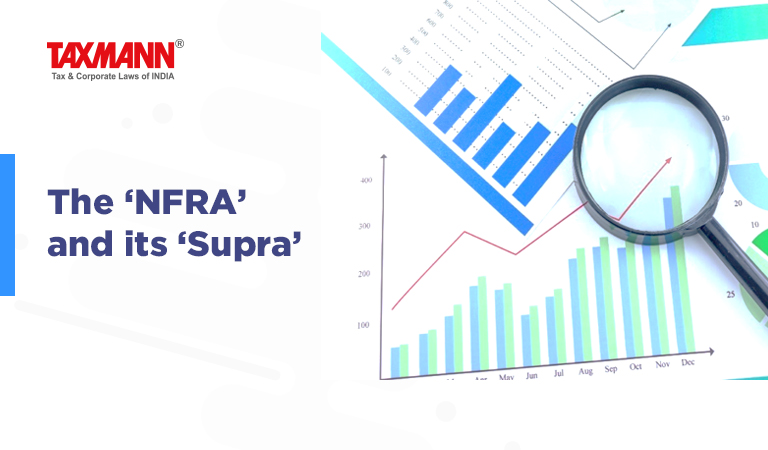The ‘NFRA’ and its ‘Supra’
- Blog|News|Account & Audit|
- 3 Min Read
- By Taxmann
- |
- Last Updated on 2 June, 2022

[2021] 131 taxmann.com 340 (Article)
The National Financial Reporting Authority (NFRA) has been making its headlines, breaking news in the last couple of weeks in the media reportedly due to the release of its Consultation Paper on Statutory Audit and Accounting Standards for Micro, Small, and Medium Companies (MSMC’s). The paper was based on its research analysis and findings out of filings that have been made in MCA-21. The focus was on medium, small and micro companies with net worth below 250 crores which are crucial for differentiating Accounting Standards and Ind AS companies. The Consultation Paper has sought views of various stakeholders to the four questions related to audit areas and in view of the global scenario elsewhere in the World, it is understood that many of these similar companies are exempted and outside the scope and ambit of audit and accounting standards. In keeping view of the data analysis and findings, the paper states that most of these MSMC’s in India are predominantly family-oriented formed as a company for limited liability purposes only for getting bank loans, mining licenses, bus permits etc. and audit done is only a sham. Further, the audit fee paid is very minuscule, with no public interest involved, whether the adoption of General Purpose Financial Statements (GPFS) and other statutory requirements relating to accounting and audit on them is necessary or desirable?
The effect of the findings and analysis of the Paper seeking views of the stakeholders created a horn in the nest amongst the accounting and auditing professional brethren. The four critical questions that have been posed presumably seem to hit below the belt of the sentiments of the accounting and auditing community as it perceives that the consultation paper was issued with no pre-consultation with the self-regulator who has been a domain for the last 70 years.
The big four questions?
1. Do you think that Micro, Small, and Medium Companies (MSMCs) depending upon some criteria and threshold should be exempted from the mandatory statutory audit under the Companies Act, 2013? If not, why not, and if yes, what would be the criteria and thresholds for exemption?
2. Do you think there is a requirement for a separate set of auditing standards for MSMEs as it exists for accounting standards? If no, why not, and if yes, what should be the basis for the same?
3. The cost of conducting an audit as per the prescribed standards is an important input for the responses to Questions 1 and 2. Do you agree with the approach for estimating the standard cost of audit computed by NFRA? If not, which areas/ assumptions need changes?
4. Do you think the current exemption thresholds for CARO, ICFR, and statutory audit applicability need to be standardized and made uniform? If no, why not, and if yes, what would be the criteria and thresholds?
The Companies Act, 2013 brought many changes in the landscape of company law administration in India. The Companies Act, 2013 consolidated many of the provisions contained in the erstwhile law (namely the Companies Act, 1956) and condensed the same. Rules relating to the Act, 2013 were facilitated in ease of doing business, better corporate governance, and easy compliances. Accounting and Auditing Standards were mandatory.
Click Here To Read The Full Article
Disclaimer: The content/information published on the website is only for general information of the user and shall not be construed as legal advice. While the Taxmann has exercised reasonable efforts to ensure the veracity of information/content published, Taxmann shall be under no liability in any manner whatsoever for incorrect information, if any.

Taxmann Publications has a dedicated in-house Research & Editorial Team. This team consists of a team of Chartered Accountants, Company Secretaries, and Lawyers. This team works under the guidance and supervision of editor-in-chief Mr Rakesh Bhargava.
The Research and Editorial Team is responsible for developing reliable and accurate content for the readers. The team follows the six-sigma approach to achieve the benchmark of zero error in its publications and research platforms. The team ensures that the following publication guidelines are thoroughly followed while developing the content:
- The statutory material is obtained only from the authorized and reliable sources
- All the latest developments in the judicial and legislative fields are covered
- Prepare the analytical write-ups on current, controversial, and important issues to help the readers to understand the concept and its implications
- Every content published by Taxmann is complete, accurate and lucid
- All evidence-based statements are supported with proper reference to Section, Circular No., Notification No. or citations
- The golden rules of grammar, style and consistency are thoroughly followed
- Font and size that’s easy to read and remain consistent across all imprint and digital publications are applied



 CA | CS | CMA
CA | CS | CMA
